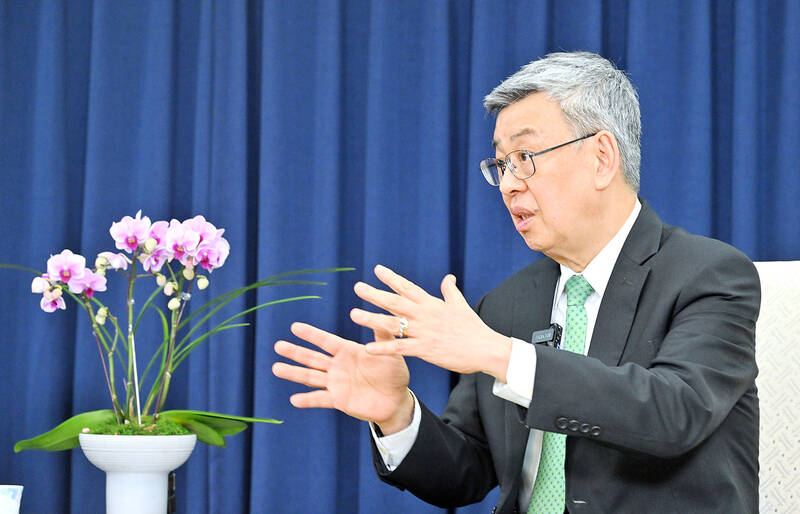China’s decision to end tariff reduction on some Taiwanese imports under the Economic Cooperation Framework Agreement (ECFA) early harvest lists is of a political rather than an economic nature, Premier Chen Chien-jen (陳建仁) said, adding that the government has been communicating with the industries most affected.
The Chinese Customs Tariff Commission on Dec. 21 last year announced it would terminate the reduced tariffs on imports of 12 Taiwanese petrochemical products, including propylene and paraxylene, starting on Monday last week.
China’s Taiwan Affairs Office spokeswoman Zhu Fenglian (朱鳳蓮) at the time said that Beijing is hopeful that cross-strait relations could “return to the right track of peaceful development,” and that negotiations to resolve trade disputes could begin “immediately” on the basis of the so-called “1992 consensus.”

Photo: Liu Hsin-de, Taipei Times
The “1992 consensus” refers to a tacit understanding between the Chinese Nationalist Party (KMT) and the Chinese Communist Party that both sides of the Taiwan Strait acknowledge that there is “one China,” with each side having its own interpretation of what “China” means.
In an interview with the Liberty Times (the sister newspaper of the Taipei Times) on Friday, Chen was asked about the government’s contingency in the event that Beijing further terminates the ECFA or some of the early harvest lists before the upcoming presidential and legislative elections.
In response, Chen said that before last month’s announcement, China already launched a unilateral probe into Taiwan’s restrictions on Chinese imports earlier in the year. So, the government has increased alertness and the Ministry of Economic Affairs has begun making an inventory of the industries that might be affected, he said.
The ministry has also communicated with businesses in the affected industries, mainly textile, petrochemical, machinery companies, he said, adding that the actual amount earned from exported items with tariff cuts under the ECFA has been decreasing.
Chen said the announcement was a decision that was not made through the ECFA negotiation mechanism, and that trade disputes could be handled through the WTO, of which both countries are members.
Facing China’s unilateral tariff move, the premier said the government must help the textile, petrochemical and machinery industries to diversify their export market destinations and upgrade their products to reduce reliance on the ECFA.
Rather then Beijing’s claims that Taiwan is facing a choice between “war and peace” and “prosperity and decline” in the upcoming election, it is a choice between “democracy and authoritarianism” and “freedom or autocracy,” Chen said.
If Taiwanese choose democracy and freedom, then Taiwan would have peace and prosperity, but if they choose authoritarianism and autocracy, it would lead to war and economic decline, he said.
Chen said Taiwan has good trade communications with the rest of the world, such as the US-Taiwan Initiative on 21st-Century Trade First Agreement Implementation Act signed last year, and that Taiwan is also signing trade-related deals with Canada and the UK, showing that Taiwan can comply with international high-standards trade rules.
Therefore, hopefully China would also trade with Taiwan under high-standard rules, rather than politicizing trade and using economic threats against Taiwan, he added.

Taiwan has received more than US$70 million in royalties as of the end of last year from developing the F-16V jet as countries worldwide purchase or upgrade to this popular model, government and military officials said on Saturday. Taiwan funded the development of the F-16V jet and ended up the sole investor as other countries withdrew from the program. Now the F-16V is increasingly popular and countries must pay Taiwan a percentage in royalties when they purchase new F-16V aircraft or upgrade older F-16 models. The next five years are expected to be the peak for these royalties, with Taiwan potentially earning

STAY IN YOUR LANE: As the US and Israel attack Iran, the ministry has warned China not to overstep by including Taiwanese citizens in its evacuation orders The Ministry of Foreign Affairs (MOFA) yesterday rebuked a statement by China’s embassy in Israel that it would evacuate Taiwanese holders of Chinese travel documents from Israel amid the latter’s escalating conflict with Iran. Tensions have risen across the Middle East in the wake of US and Israeli airstrikes on Iran beginning Saturday. China subsequently issued an evacuation notice for its citizens. In a news release, the Chinese embassy in Israel said holders of “Taiwan compatriot permits (台胞證)” issued to Taiwanese nationals by Chinese authorities for travel to China — could register for evacuation to Egypt. In Taipei, the ministry yesterday said Taiwan

‘LIKE-MINDED PARTNER’: Tako van Popta said it would be inappropriate to delay signing the deal with Taiwan because of China, adding he would promote the issue Canadian senators have stressed Taiwan’s importance for international trade and expressed enthusiasm for ensuring the Taiwan-Canada trade cooperation framework agreement is implemented this year. Representative to Canada Harry Tseng (曾厚仁) in an interview with the Central News Agency (CNA) said he was increasingly uneasy about Ottawa’s delays in signing the agreement, especially as Ottawa has warmed toward Beijing. There are “no negotiations left. Not only [is it] initialed, we have three versions of the text ready: English, French and Mandarin,” Tseng said. “That tells you how close we are to the final signature.” Tseng said that he hoped Canadian Prime Minister Mark Carney

POSITIVE DEVELOPMENT: Japan and the US are expected to hold in-depth discussions on Taiwan-related issues during the meeting next month, Japanese sources said The holding of a Japan-US leaders’ meeting ahead of US President Donald Trump’s visit to China is positive news for Taiwan, former Japan-Taiwan Exchange Association representative Hiroyasu Izumi said yesterday. After the Liberal Democratic Party’s landslide victory in Japan’s House of Representatives election, Japanese Prime Minister Sanae Takaichi is scheduled to visit the US next month, where she is to meet with Trump ahead of the US president’s planned visit to China from March 31 to April 2 for a meeting with Chinese President Xi Jinping (習近平). Japan and the US are expected to hold in-depth discussions on Taiwan-related issues during the